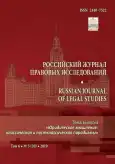Transformation of the mechanisms functioning of law enforcement in the conditions of digitalization
- Authors: Prokhorova E.N.1
-
Affiliations:
- Kaliningrad branch of the St. Petersburg University of the Ministry of Internal Affairs of Russia
- Issue: Vol 6, No 3 (2019)
- Pages: 174-178
- Section: Criminal Process and Law enforsment
- URL: https://journal-vniispk.ru/2410-7522/article/view/19081
- DOI: https://doi.org/10.17816/RJLS19081
- ID: 19081
Cite item
Full Text
Abstract
This article is devoted to the study of the problems of interaction of law enforcement agencies in the field of countering modern security threats. In this connection, it justifies the need to create a mechanism for the joint operation of security and security elements of the law enforcement system through the prism of the main trends of law enforcement policy, allowing to draw conclusions about how the features of this process affect the quality of law enforcement. At the same time, the influence of the features of the law enforcement mechanism is connected with the minimization of its costs on the effectiveness of the activities of security agencies at the expense of provisional funds.
It is noted that the current stage of development of society is characterized by the transformation of many legal relations, including and law enforcement. However, the use of information technologies by terrorists causes, perhaps, most of all the issues for the resolution of which the forms of interaction of law enforcement agencies that ensure the integration of their activities are proposed.
By the example of the problem of countering telephone terrorism with the use of modern technical achievements, the importance of the integrated interaction of law enforcement units, which the author regards as a tool to increase the effectiveness of law enforcement, is shown. It was noted that objectively existing needs for the integration of the actions of states in the suppression, prevention and punishment of such crimes, lead to the intensification of international cooperation in the designated area.
Special attention is paid to the Kaliningrad region because of its autonomy and vulnerability due to its remoteness from the main territory of the country and its environment to states that pose a potential threat to the security of the Russian Federation. The author formulates conclusions on the results of the study.
Full Text
##article.viewOnOriginalSite##About the authors
Eugenia N. Prokhorova
Kaliningrad branch of the St. Petersburg University of the Ministry of Internal Affairs of Russia
Author for correspondence.
Email: tyurina39@mail.ru
Candidate of Law, Senior Lecturer of the Department of General Law Disciplines
Russian Federation, KaliningradReferences
- Abubekerova D. A. The system of security agencies in the Russian Federation // National security in modern Russia: a strategy to counter extremism and terrorism and the prospects for overcoming global problems: materials of All-Russia. scientific konf. / redl.: N. A. Podolny, Yu. V. Burov. Saransk: 2016. T. 1. 340 p.
- Bratko A. G. Law enforcement system. Theory questions. Moscow, 1991. 208 p.
- Vinokurov E. Theory of enclaves. Kaliningrad: TerraBaltica, 2007. 342 p.
- Gavrilenko A. A. The system of law enforcement agencies: the concept and elements // Actual problems of law-making and law enforcement. Irkutsk: Irkut Publishing House. state University, 2009. P. 191-196.
- Grachev S. I. Counterterrorism: organizational, legal, financial aspects and prevention issues. Training pos. by ed. O. A. Kolobova. Nizhny Novgorod: FMO / ISI UNN them. N. I. Lobachevsky, 2010. 166 p.
- Gutsenko K. F., Kovalev M. A. Law enforcement agencies: monograph. Moscow, 2000. P. 8.
- Damaskin O. V. Actual issues of countering terrorism organization // Bulletin of military law. No. 1. 2016. P. 67-76.
- Kotenko I. V., Yusupov R. M. Information Technologies for Combating Terrorism // Information Security INCIDE. 2009. No. 2. Р. 74-79.
- The victorious MG Features of the geopolitical position of the Kaliningrad region and the manifested threats to the border security of the Russian Federation // Collection of scientific articles. Materials of the scientific and practical conferences of the Moscow Military Institute of the Federal Border Guard Service of Russia. No. 9. P. 27.
- Shuvalov I. I., Khabrieva T. Ya., Feng Jingzhu, et al. BRICS Cyberspace: Legal Dimension: A Monograph. Moscow: Institute of Legislation and Comparative Law under the Government of the Russian Federation, 2017. 336 p.
Supplementary files







